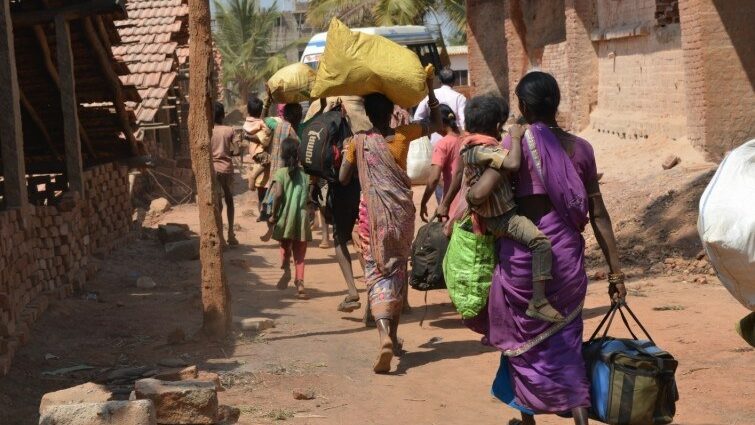25 Freed From Brick Factory Near Bangalore
Slavery
BANGALORE, INDIA,
February 20, 2015
Twenty-five people are now free thanks to an IJM-assisted operation on February 18. Held in forced labour slavery in a brick factory near Bangalore, the families were denied any opportunity to leave–even for medical aid.
One survivor shared a harrowing story involving his 5-year-old son, saying, "I have been here for four months, but it feels like four years. My son was hurt on the head, and he started bleeding badly. His shirt was covered in blood. Still the owner would not take him to the hospital.”
The news of this rescue comes only days after 333 slaves were freed in Tamil Nadu, the second largest operation in IJM history.
Oppressive Conditions in the Factory
The migrant workers originated from the central-eastern state of Odisha, a common recruitment area for traffickers. To vulnerable families, the promise of a job and an advance payment sounded appealing. However, the owner quickly tacked on exorbitant interest rates, forcing the whole family to continue to work and trapping them in a system of forced labour slavery.
"In this case, like in most bonded labour cases, the owner of the brick kiln had gone to Odisha and trafficked these labourers to his brick kiln in Bangalore,” said Esther Daniel, Director of System Reform of IJM Bangalore. "Once here, he abused and exploited them denying them their basic human rights and dignity. The families faced constant violence in the factory.”
One 50-year-old woman shared that after a brick had injured her leg, the owner dragged her to his office, stomped on her and threatened to cut her. Another man said that he was forced to make a tourniquet to stop the bleeding on a gash on his son’s forehead when the owner refused access to medical aid.
^GALLERY:18^
Not only were conditions violent, but the labour was brutal. Littered with painful cuts, the survivors’ hands reflect the long and grueling work of making bricks all day.
Labour began at 3:00 am for the men and 6:00 am for the women. The victims worked for seven days a week under 24/7 supervision by watchmen. When the men left to buy food at the market on Sundays, the women and children were held as collateral to force their return. Even when the workers went to the bathroom, the watchmen supervised them.
A Much-Needed Rescue
On February 18, IJM Bangalore joined the Anti-Human Trafficking Unit (AHTU) in a rescue operation. The officers conducted the rescue swiftly to ensure the safety of the victims. Upon seeing the AHTU and IJM arrive, the enslaved men, women and children ran to the vehicles, desperate to leave the confines of the brick factory.
The IJM staff stood alongside the families as they were interviewed and as police documented evidence for the case. The survivors also received hot meals as they testified to the officers.
On February 20, survivors received the good news that release certificates had been granted to all of the men and women survivors. These certificates cancel any debt the owner claims is owed and entitles the holder to monetary compensation from the government. Officials also purchased tickets so that the survivors could return to their home state.
To help in the transition back to freedom, families will join IJM’s two-year aftercare program. Staff based in Odisha will provide long-term support, equipping survivors with the skills and tools to thrive in freedom.
^GALLERY:19^
A Commitment to Justice
When conducting the rescue, the AHTU officers persistently searched for the owner. Once found, the owner was arrested and a formal complaint filed against him. The complaint listed offenses in relation to the Bonded Labour System Act, making him eligible for up to seven years in prison.
In an encouraging step for justice, just last week an owner was given a seven-year sentence for the forced slave labour of 42 people in a rock quarry.
Daniel notes the initiative of justice and legislative officials as an important step to ending modern-day slavery, saying: "The prompt action by the police and AHTU sends a strong message that bonded labour trafficking is a crime that will no longer be tolerated.”
Join IJM in making more rescues possible by becoming a Freedom Partner >>